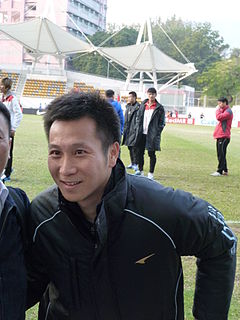
Guangzhou R&F Football Club is a professional football club that plays in the Chinese Super League under licence from the Chinese Football Association (CFA). The team is based in Guangzhou, Guangdong and their home stadium is the Yuexiushan Stadium which has a seating capacity of 18,000. They are owned by the Chinese property developers R&F Properties who took charge in June 2011. The club's English name R&F is short for "Rich" (富) and "Force" (力).
Ma Mingyu is a former Chinese International football player. He represented Sichuan Quanxing throughout the majority of his career, having several spells with them. He also represented Guangdong Hongyuan and Italian Serie A side Perugia. While internationally he would play in the 1996 AFC Asian Cup, 2000 AFC Asian Cup and captain China's campaign during the 2002 FIFA World Cup.

Beijing Institute of Technology Football Club or simply BIT is a professional Chinese football club that currently participates in the China League Two division under licence from the Chinese Football Association (CFA). The team is based in Haidian, Beijing and their home stadium is the 5,000 capacity BIT Eastern Athletic Field. Their current majority shareholders are Beijing Institute of Technology (BIT) and Joan Oliver who acquired a 29 percent stake on December 5, 2016.

Guangzhou Evergrande Taobao Football Club is a professional Chinese football club that participates in the Chinese Super League under the license of the Chinese Football Association. The team is based in Guangzhou, Guangdong, and their home stadium is the Tianhe Stadium which has a seating capacity of 58,500. Their majority shareholders are the Evergrande Real Estate Group (56.71%) and the e-commerce company Alibaba Group (37.81%) while the rest of the shares are traded in the Chinese OTC system.

Sichuan Jiuniu Football Club is a Chinese football club based in Chengdu, Sichuan, China. It currently plays in the China League Two.

Shenyang Dongjin Football Club was a Chinese football club based in Shenyang, Liaoning and their home stadium is the Shenyang Urban Construction University Stadium that has a seating capacity of 12,000.
Guangdong Sunray Cave Football Club was a Chinese professional football club based in Guangzhou, Guangdong which last played in the China League One division.

Guizhou Hengfeng F.C. is a professional Chinese football club that currently participates in the China League One division under licence from the Chinese Football Association (CFA). The team is based in Guiyang, Guizhou and their home stadium is the 51,636-seat Guiyang Olympic Sports Center. Their current majority shareholders are Hengfeng Real Estate, Guizhou Zhicheng Enterprise Group Investment Co., Ltd. and the Guizhou Provincial Sports Bureau.

Lu Lin is a Chinese football player who currently plays for Guangzhou R&F as a Left winger in the Chinese Super League.

Liaoning Football Club, officially known as Liaoning Hongyun, is a professional association football club that currently participates in the China League One under licence from the Chinese Football Association (CFA). The team is based in Shenyang, Liaoning Province and their home stadium is the Tiexi New District Sports Center that has a seating capacity of 30,000. Their current majority shareholders are the Liaoning Sport Technology College and the Huludao Hongyun Group Co., Ltd, which is part of the real estate and financial conglomerate the Hongyun Group.
Chi Minghua is a Chinese football coach and former international football player. As a player, he spent the majority of his career playing as a Defender for Guangdong football team while internationally he represented China in the 1984 Asian Cup.

Guangdong Southern Tigers Football Club or simply Guangdong Southern Tigers is a professional Chinese football club that currently participates in the China League One division under licence from the Chinese Football Association (CFA). The team is based in Meixian District, Meizhou, Guangdong and their home stadium is the Meixian Tsang Hin-chi Stadium that has a seating capacity of 20,221. Their current majority shareholder is engineering, and construction company Shenzhen Techand Ecological Environment Co., Ltd.
Ge Zhen is a Chinese football player who currently plays for Chinese Super League side Shenzhen FC.
Liu Tao is a Chinese football player who currently plays for Chengdu Better City in the China League Two.
Wang Kai is a Chinese football player who currently plays for Chinese Super League side Wuhan Zall.
The 2016 China Amateur Football League season is the 15th season since its establishment in 2002. It is the highest amateur association football league in PR China with some semi-professional clubs. 44 clubs were qualified for the second round.
Guo Yijun, also spelled as Guo Jijun, is a Chinese association football coach and a former defender or midfielder who represented his country with the senior national team, and with the national 1988 Summer Olympics selection.
The Guangzhou Derbies, or Canton Derbies are various local derbies between the football teams of Guangzhou. The term specifically refers to individual matches between the teams, but can also be used to describe the general rivalry between the different clubs. Guangzhou Apollo against Guangzhou Matsunichi (1995–2000) and Guangzhou Evergrande Taobao against Guangzhou R&F are ranked as two of the most ferocious Guangzhou Derbies.

















